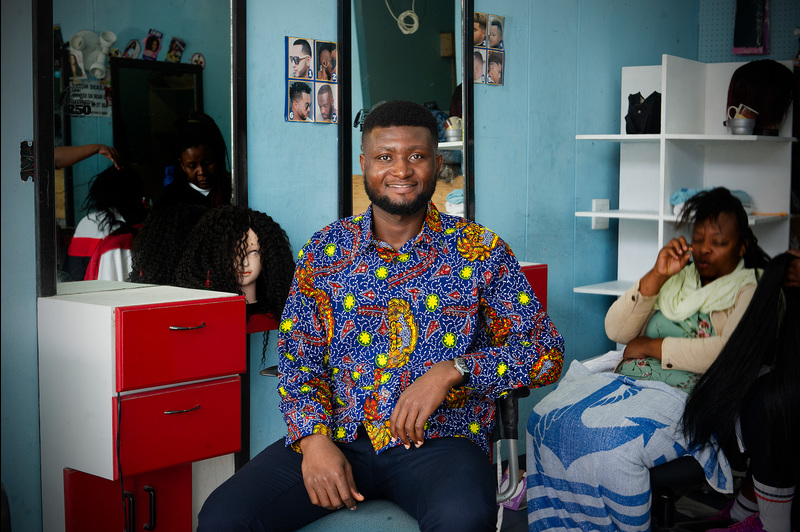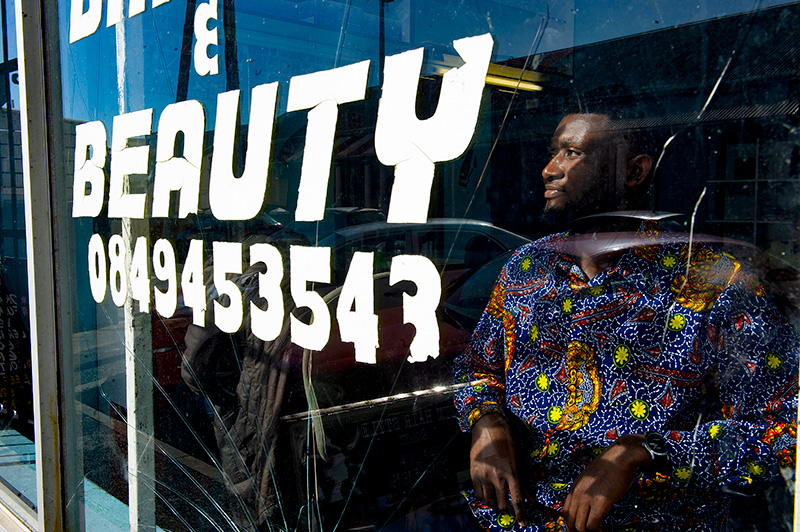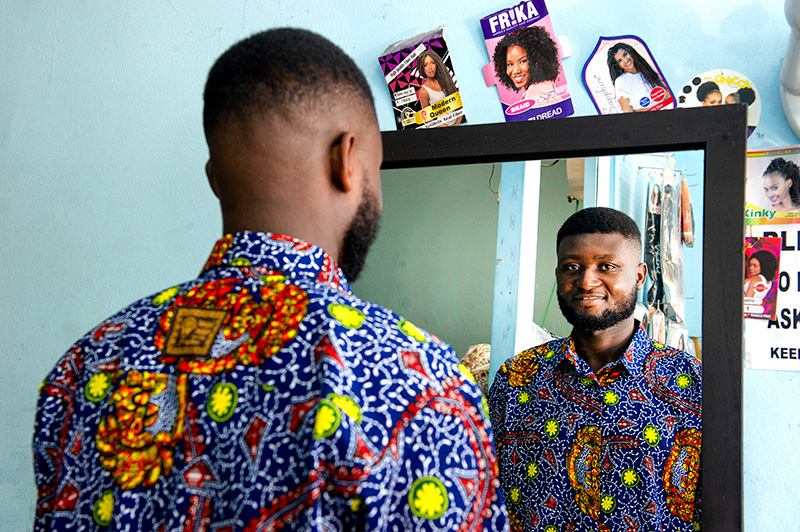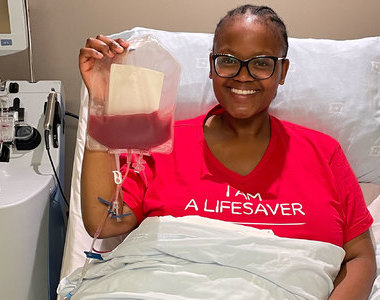Walking in his mother’s footsteps
16 August 2022 | Story Helen Swingler. Photos Lerato Maduna. Read time 6 min.
Growing up in Ghana, Bright Tetteh learnt a lot from his single mother: determination, optimism, and a strong sense of community. These were his early stepping stones. He excelled at school and won a community prize for volunteerism. The same ethos is now the cornerstone of Learn a Skill, a life-changing programme the University of Cape Town (UCT) student co-founded for unemployed young women in Ghana.
Facing economic hardship, Tetteh’s parents dropped out of school young. His late father, Samuel Tetteh, was an entry-level machinist at a rice mill. His mother, Lydia Ocansey, later supported her family by selling charcoal. Family resources were meagre and “almost shut my dreams”, he said.
But he dug in, and became the first in his family to graduate from high school.
This was his springboard to higher education: a first-class degree in economics from Kwame Nkrumah University of Science and Technology (KNUST), supported by the Mastercard Foundation Scholars Program (MCFSP).
That success brought him far south, to the ‘toe-end’ of the continent. Tetteh is now part of the prestigious MCFSP at UCT, in the final year of a master’s degree in economics, specialising in economic sciences.

Giving back is second nature to him. He has volunteered at five other organisations that are tackling the complex challenges in his country by creating measurable and sustainable impact. He is also the pioneer of the Subikese education-aid project in Ghana, to build a simple six-classroom block to replace the community’s dilapidated wattle-and-daub structure. The project led to the construction of two classrooms.
Lifeline for unskilled women
Based in Koforidua, eastern Ghana, Learn a Skill extends this work. Tetteh co-founded the community-based social entrepreneurship programme with compatriot Josephine Assare in 2020. (Assare was a Mastercard Foundation Scholar at the University of Arizona, in the United States.) Bernice Otoo manages the project.
Unemployment in Ghana has been increasing for decades, particularly among the youth, who can’t afford school and drop out. Learn a Skill is a potential lifeline in a country where only 10% of the population is formally employed.
According to the University of Ghana’s Institute of Statistical, Social and Economic Research, an estimated 250 000 young people enter the labour market every year. Only “a handful” are absorbed by the public and private sectors.
“Dropping out of school with no skills, they face the likelihood of teenage pregnancy and other uncomfortable social situations.”
Unemployment makes young women particularly vulnerable, said Tetteh.
“Dropping out of school with no skills, they face the likelihood of teenage pregnancy and other uncomfortable social situations.”
This perpetuates the generational cycle of poverty.
Learn a Skill aims to change that. The programme teaches vocational skills to unemployed young women (80% of their target trainees) aged between 18 and 25 in rural areas. These are skills such as hairdressing, sewing and beadmaking. These lay the foundations for entrepreneurship and financial independence that will set the young women up for life – beyond the poverty Tetteh’s mother and family knew.
Working with families
Participants are carefully screened for suitability. Because the programme targets young women from rural areas, the skills training is augmented by a programme of mentorship, guidance and support, which continues through the participants’ internships.
The team works closely with trainees’ families, who are often loath to lose a potential breadwinner as they see their young women striking out independently in a society that leans towards patriarchy.
But it requires a commitment from both the participants and their families.
“The trainee is expected to enrol in each skill for a minimum of six months and a maximum of three years,” said Tetteh.

The project covers the full costs of the training, and a transportation allowance when required.
At the management level, there are monthly online meetings to discuss progress, plans, challenges and impact-related topics. The team also interacts with trainers and families to monitor each participant’s progress. Their immediate aim in Ghana is to reach five villages, training 10 self-employable or employable young women by 2025.
The project is still young, but Tetteh believes it offers a social entrepreneurship model for other African countries. As such, the initiative addresses the United Nations Sustainable Development Goals 1.1, 4.4 and 8.5, to eradicate extreme poverty around the world.
Sustainability for success
The biggest challenge to sustainability is funding, said Tetteh. Funders are welcome, as are those able to offer participants training internships and similar opportunities.
“When you’re passionate about something, it becomes easy to do.”
It’s a significant drain on his energy and time reserves, a demand he balances with his postgraduate studies. But Tetteh also learnt tenacity from his mother.
“When you’re passionate about something, it becomes easy to do. And I was passionate about this, right from high school, when I won the award for best volunteer student in my community. Volunteerism was already part of me, and the Mastercard Foundation Scholars Program also heightened that.”
A message to women in August?
Tetteh has several.
“I believe in them. My mom has been a single mother, and she has proven to be the strongest person I’ve come to meet. So, I know what an African woman can deliver. They should know what they want and just go for it. They can achieve more than they imagine.”
And for men?
“I want to tell men in Africa that our women are strong, they are brilliant, and they are courageous. And when they are given the necessary support from us, they can do a lot of things – and they can change the world. So, we should continue to be behind them, and trust that they can make it happen.”
 This work is licensed under a Creative Commons Attribution-NoDerivatives 4.0 International License.
This work is licensed under a Creative Commons Attribution-NoDerivatives 4.0 International License.
Please view the republishing articles page for more information.
Listen to the news
The stories in this selection include an audio recording for your listening convenience.























































































































































































































































































































































































